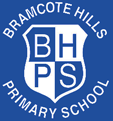Phonics and Reading
Our Intent
At Bramcote Hills Primary School, we value reading as a key life skill and are dedicated to enabling our pupils to become lifelong readers. We believe that reading is key for academic success and that children who read regularly have increased chances later in life. In the early stages of reading, we strongly advocate the use of phonics and children are given daily opportunities to blend and segment words to read and write, using the Monster Phonics DFE Validated Scheme. Alongside this, we provide children with a diet rich in high quality literature to foster and promote high quality vocabulary and a genuine love of reading. By the end of EYFS, we want the children to have a strong phonological awareness and have the ability to hear and discriminate sounds within words. In reading, they should be able to say a sound for each letter in the alphabet and recognise many digraphs. They should read words consistent with their phonic knowledge by sound-blending and read aloud simple sentences and books, including some common exception words (‘tricky words’). In writing, they should be able to write recognisable letters, most of which are correctly formed; spell words by identifying sounds in them and representing the sounds with a letter or letters; and write simple phrases and sentences that can be read by others.
By the end of Year 1, children should be able to state some of the more common alternative pronunciations for graphemes and read many familiar words without the need to blend the sounds out loud first. They should be increasingly able to apply their phonic knowledge to select the most plausible graphemes (using the ‘best bet’ strategy) when spelling new words. The majority should be able to read and write an additional 33 common exception words correctly. This is continued into Year 2 where children continue to explore alternative pronunciations and become increasingly adept at making the correct choice of grapheme when attempting new words. They learn an additional 64 common exception words so that, by the end of Year 2, most children are able to read and spell many words correctly, including those containing common suffixes.
Our Implementation
- In EYFS and Year 1, children have a daily phonics session, following the Monster Phonics teaching sequence. This ensures that children make rapid progress in systematically learning and revising phonemes and graphemes and common exception words.
- In Year 2, children have phonics/spelling sessions three times per week, revising previously taught phonics content and teaching spelling rules and strategies.
- Assessments are carried out regularly to identify those children who may be falling behind. 1:1 and small group interventions are then put in place to enable these children to catch up.
- Children are given a reading book as soon as they begin to be taught graphemes. The books given are initially phonic based and are matched closely to a child’s phonic knowledge in order that they can be given opportunities to read words by blending the sounds that have already been taught. This then gives them early success in reading and prevents them having to ‘guess’ words.
- Only when children have a secure phonic knowledge, they then progress to ‘book banded’ books (Green book bands upwards). These are carefully selected books that are colour-coded according to their level of difficulty. We regularly assess children’s reading, using miscue analysis, to check that the child is reading books with an appropriate level of difficulty (95%+ accuracy).
- Children are exposed to a wide variety of literature covering different genres. This includes listening to stories read by adults, taking home library books (including the ‘100 Books to Read Reading Spine Books), studying books in more depth, paired reading with other classes and community reading events.
- Class teachers hear children read weekly using books that are matched to the graphemes being taught that week (F2 and Year 1). This is often done during a guided reading session. Children in Year 2 upwards have a 'Whole Class Reading' session twice a week, focussing on developing reading fluency, stamina and comprehension skills. Children are also given a 'home reader' to practise and consolidate their phonic application and comprehension skills. Children who do not read regularly at home or who need additional practice are also heard regularly by Teaching Assistants, parent helpers and our 'Reading Rocketeers'..
- Reading books are changed twice a week. We encourage children to re-read books at least three times before progressing onto the next book. In doing this, they can focus on Read 1 – Word accuracy, Read 2 – Reading fluency and Read 3 – More sophisticated reading comprehension
- Each class has a reading area that is filled with books suitable for their reading age. Children are given opportunities to read throughout the day, including during their Continuous Provision. We also have access to the Education Library Service and draw on their expertise to source a range of high quality materials to enhance our topic work.
Our Impact
By the time children leave Key Stage 1, the vast majority are fluent readers reading at over 90 words per minute. They have a strong phonic awareness and can tackle unknown words confidently. Last year, 93% of our children reached the required standard in the Phonics Check in Year 1. This strong grounding enables teachers in Key Stage 2 to focus on developing fluency and comprehension. However, we firmly believe that reading is the key to all learning and our impact is demonstrated in or children’s attitude to reading and their genuine love of books. This is modelled by all of our staff who regularly share their own enthusiasm for books. Our children can talk about their favourite authors and can recommend books to their peers. They evaluate an author’s use of language and the effect this can have on the reader. Above all, the vast majority read for pleasure and understand the magical world that books can unlock for them.

